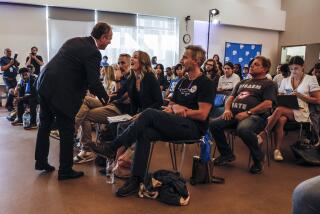Rivals on Road, Friends on Hill
- Share via
WASHINGTON — His fellow senators greeted John F. Kerry like a political victor on Capitol Hill. They greeted his then-rival, John Edwards, like a long-lost friend.
Returning to the Senate on Tuesday for the first time in months to vote on a gun liability bill, Kerry was met with congratulatory handshakes. Edwards, flashing his trademark smile, got bear hugs and back slaps. Democratic Party sources said late Tuesday that the North Carolina senator would bow out of the race.
His voice hoarse from the campaign trail, Kerry’s appearance and bearing were presidential. He stood tall, impeccably dressed, and with every silver hair in place. In a floor speech delivered to a nearly empty Senate chamber, the Massachusetts Democrat criticized President Bush on gun control and laid out his reasons for supporting an amendment to extend the 10-year-old assault-weapons ban.
Leaping to his feet to respond, Sen. Larry E. Craig, the Idaho Republican who led the fight against extending the assault weapons ban, took note of the moment.
“I am honored by the presence of the senator from Massachusetts,” Craig said. “I am honored that we have lifted the gun debate ... to presidential politics.”
Edwards chose not to speak on the gun bill or the amendments offered to the measure. Instead, he reconnected with the Senate, heading first to his offices in the Dirksen building.
Staffers, many of whom hadn’t seen their boss since November, when he had last put in an appearance to cast a vote, greeted him with “a lot of hugs and kisses,” according to Michael Briggs, the senator’s press secretary.
Edwards found his refrigerator restocked with the Diet Cokes he guzzles, and his desk cleared of the paperwork that had piled up while he was gone. A book, “The Purpose-Driven Life,” embossed with Edwards’ name, lay on the desk, a gift from Senate Chaplain Barry Black.
Edwards met with a quartet of surprised commissioners from North Carolina’s Cumberland County, who had thought they were going to see only his legislative staff. And then he headed to the Senate.
With a thumbs up to a Senate clerk, Edwards voted to extend the assault-weapons ban. Then he turned to work the room.
“Welcome back!” boomed an obviously delighted Sen. Ernest F. Hollings (D-S.C.) as Edwards approached.
The senator, who managed to mount the most intense challenge to Kerry’s bid for the Democratic presidential nomination, then joined one of his good friends -- Edward M. Kennedy, the senior senator from Massachusetts, who has been campaigning flat-out for Kerry for months.
The pair spoke for several minutes, until Kerry joined them. Kerry spoke animatedly to his rival, at one point poking Edwards playfully in the arm with his finger -- Edwards said something in response, and the three broke up laughing.
“It was good to see a couple of friends, we were yukking it up,” Kennedy said when asked by a reporter about the exchange. He referred to Kerry as “the nominee,” as though his victory were a foregone conclusion
And that is what it felt like on the Senate floor, said Ross Baker, a political science professor at Rutgers University who was granted permission by the Senate to watch Tuesday’s vote from the floor.
The senator’s appearance had the feel of a “victory lap,” Baker said. “People came up and paid homage to Kerry. It was clear that they were treating him as the presumptive victor.”
The vote on the amendment over, Kerry and Kennedy joined Democratic Sens. Dianne Feinstein of California and Charles E. Schumer of New York, two leaders on the assault-weapons ban, to pose for photographers in the reception hall outside the Senate chamber.
Schumer credited Kerry and Edwards with changing the dynamic of the debate in favor of the amendment.
“If Kerry and John Edwards had not said they were coming back for the vote, we would have lost,” he said.
Feinstein said Kerry, who had not voted in the Senate this year, returned to the chamber with enhanced status and prestige.
“I was listening to his speech [on the assault-weapons amendment] and thought, how many times have I listened to him? This time I really listened to him,” Feinstein said. “What a difference being a presidential candidate makes.”
Inside the chamber, Edwards got back to the sort of mundane work that takes up much of a senator’s life, introducing two bills focused on his state: one honoring Cumberland County as it celebrates its 250th birthday; the other naming a post office in Roxboro, N.C., in honor of Oscar Scott Woody, a seagoing postal clerk from Roxboro who died on duty onboard the Titanic in 1912.
More to Read
Get the L.A. Times Politics newsletter
Deeply reported insights into legislation, politics and policy from Sacramento, Washington and beyond. In your inbox twice per week.
You may occasionally receive promotional content from the Los Angeles Times.










